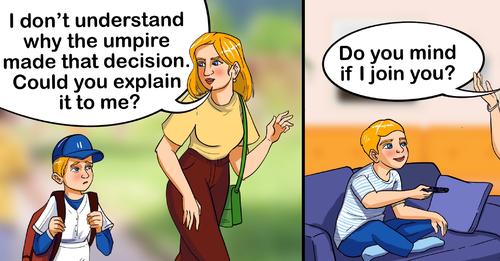
A happy family communicates with one another to share happiness and sorrow in order to remain as a team. As parents, you have to attend to all your infant’s needs, and before you know it, they are already old enough to add their input into family discussions! A child depends on their parents to test their boundaries and discover their own identity at every stage. To make this more accessible for the child, it is essential that parents communicate to their children according to their age group and what they need at that particular growth period. Here is a list of how parents can lay the foundation of a happy relationship with their children and help them grow as emotionally strong humans.
Age: 0 To 2 Years
Make a personal connection with them and assist them in exploring the world.
This is a critical time in a child’s development since they are constantly learning and gaining new abilities. By the time they are 2, they can speak only approximately 50 words and rely on crying as their primary method of communication (1). In addition, children are drawn to physical touch at this age because it helps them relax and progress.
What Parents Should Do
A child’s physical, emotional, and social development depends on their parents’ undivided attention at this stage in their lives. Children imitate the actions and feelings of those they observe daily. A child’s ability to link their actions and other people’s reactions can only be strengthened if you react to the signals they send you and keep your responses consistent.
Age: 3-5-Year-Old
Encourage curiosity and allow them to discover new things about themselves at a young age.
It’s natural for them to ask many questions about the world. However, they are only beginning to discover how to connect with others vocally and may still be unsure of how they should engage with others.
They may have a hard time focusing on the future and don’t plan ahead. The ability to focus solely on a single task for a lengthy period may be a challenge for them. In addition, it is common for children to misunderstand their feelings and not know how to handle them at this age.
What Parents Should Do
Invest some time answering all of your child’s queries and hearing them out. The child may notice if you get preoccupied, and they may conclude that even if you are physically present, you have abandoned them emotionally. Talk to your child and help them understand the world.
Age: 6 To 8 Years Old
Be ready to answer the first “adult” questions and show them how much you care about their development.
When children reach this age, they often begin attending school and, for the first time, have the opportunity to socialize with others their own age without the constant supervision of their parents. As a result, they develop a sense of self-confidence and investigate their own thoughts and feelings.
What Parents Should Do
Instead of berating your children for doing anything incorrectly, parents can encourage them to follow their hobbies and take pride in their accomplishments. Let them be who they are, and don’t treat them as if you always know what’s best. Be willing to make concessions and admit when you’ve made a mistake.
Age: 9 To 11 Years
Take the time to show them that you respect them and see them as adults.
Preteens may act as if they no longer require parental assistance. Instead of confiding in their parents, they prefer to confide in their friends. They may begin to push the limits of their personal space to get what they want. Your child may no longer be the adorable tiny angel you remember them.
Even if they don’t realize it, children still need parents most at this time. A few years later, they’ll be going through adolescence, and they’ll need your support and love as they deal with all of the drama and wild hormones.
What Parents Should Do
Do what you can to connect with your child by finding a shared interest. Keep your queries regarding your child’s day at school to a minimum rather than trying to start a dialogue. Instead, identify a topic of genuine interest and simply listen. Make plans to engage in some enjoyable activities together. Don’t force yourself to spend time together as a family simply because you have to.
Age: 12 To 18 Years
By showing your confidence and actively participating in the conversation, you value their privacy.
The adolescent years may be an exciting and frightening time for children and their parents. As children become older, they begin to believe that they are already adults and seek the freedom to do as they like. But, unlike their teenage years, these actions might have a long-term effect on their lives.
What Parents Should Do
Even if the issue appears minor to you, show them your support and acknowledge their sentiments. As with a failed test, it’s essential to demonstrate to them that you understand their concerns and are prepared to deal with the stress of high school life. Tell your children how proud you are of their accomplishments and how much you care about them.
So, now that you know how to talk to your child, you will have a best friend at every age! Make sure you tell them that they have your support and that you can help them more than an outsider can. It is also essential to gain their trust from a younger age. Happy Parenting





